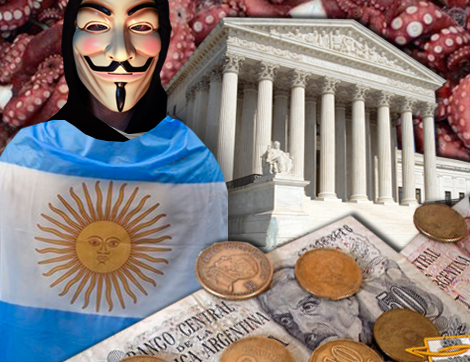
• Bizarre ruling by U.S. court over sovereign nation unenforceable
By Bill White
The United States Supreme Court reached a new level of hubris recently when it ordered the sovereign nation of Argentina to pay in full defaulted bonds bought by hedge funds, thus demonstrating the arrogance of the black-robed body as it attempts to govern the world through judicial legislation.
How the Court intends to enforce the ruling against Argentina, which is an independent nation not subject to U.S. law, is unclear to experts.
In 2001, Argentina defaulted on its debt after its government chose to continue to provide services for its people rather than continue to pay extortionate interest to international bankers. Argentina then restructured most of its $100 billion debt, paying out $9.3 billion in new debt in exchange for $93 billion of the old.
Two hedge funds, Aurelius Capital Management and Elliott Management Corporation, then bought the remaining $7 billion in debt for a few hundred million and went to court demanding that Argentina pay the debts in full.
The result has been a 12-year court battle in the District Court of New York, the U.S. Second Circuit and now the U.S. Supreme Court, with a series of rulings that U.S. law governs Argentina’s debt and that Argentina must treat all creditors “equally.” Ironically, this means that Argentina could satisfy U.S. law by defaulting “equally” on both its restructured as well as its unrestructured debt.
The ruling shows that the power in the U.S. and entities arising from the Bretton Woods system such as the World Bank and the International Monetary Fund (IMF) act on behalf of private banking interests. Typically, when a nation like Argentina or Greece goes too deeply into debt, the IMF or other international entities such as the European Union step in and impose “austerity.” The goal of austerity is to make sure interest on the national debt is paid to international banks, while the nation’s people receive diminished services.
By pursuing Argentina in this manner, the international banking community is sending a message that they will always be paid and that any nation that chooses to default and buck the bankers’ power will be pursued by the bankers’ attack dog, American “law.”
But despite these efforts, the Supreme Court ruling is likely unenforceable. An effort to seize an unnamed Argentinian Navy training vessel in Ghana last year to pay the bonds ended up in failure after a United Nations tribunal ordered the ship released.
On November 1, the Second U.S. Circuit Court of Appeals in New York denied a motion to lift a stay it had issued in favor of Argentina pending Supreme Court review of a ruling for the holdout bondholders in August.
Bill White is a freelance journalist and publisher based in Roanoke, Virginia. He has also written articles for THE BARNES REVIEW (TBR) magazine. For a sample copy of TBR, send $4 to TBR, P.O. Box 15877, Washington, D.C. 20003.

